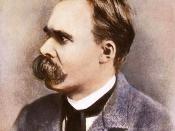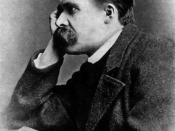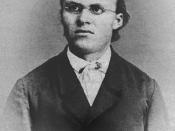Three types of history according to Nietzsche are monumental, antiquarian, and critical. Monumental history tells us how to act in the present according to our past. Disadvantages of such history are that it portrays only the affects but not the causes. In addition, monumental history doesn't appreciate individuality and looks only at the general not the specific. However; some advantages of monumental history are, that monuments are essential for reminder of the past and continuity eliminates doubt. Antiquarian history also has its pros and cons. It is the history of the man who wants to know himself, and looks at what is small and limited of everyday life. Advantage of such history include interest in individuality, building identity as individuals but also collective in tradition and religion. On page 20 and 21 Nietzsche also talks about the disadvantages of such history. Antiquarian history allows no growth; it is conservative and reduces life to knowledge.
The last type of history according to Nietzsche is critical. It is Nietzsche's favorite history because its for the Rebel and its for the person who wants to break with the past. The history is good because it builds the future on new grounds, however; it is also dangerous for life itself. According to Nietzsche this is a need for life to go on and it is risky. But according to Nietzsche we have to take risks and not stay on conservative side. You can't be intact with history throughout your life because it is poisoning the present and allows no mobility. Freedom for Nietzsche is not knowing the future, thus we have to take risks and hope for the best. The optimist standpoint of a historical man states that we have to have hope in the future rather than be entangled with the...


